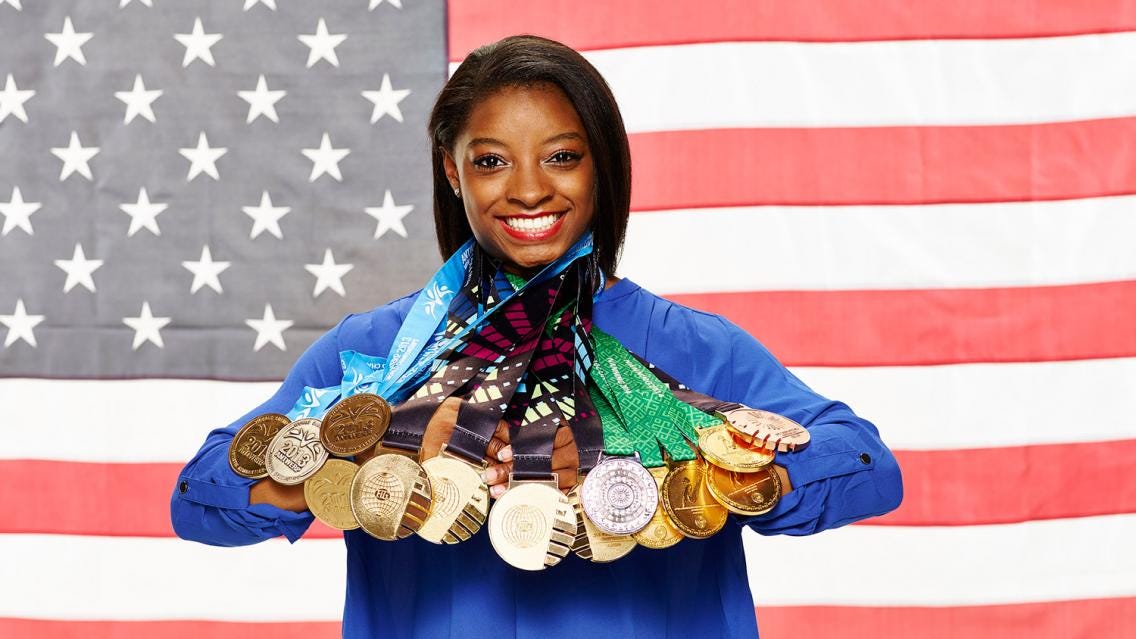Simone Biles Reminds Us All That Women Are Just a Social Construct
Simone Biles has taken Riley Gaines to task, educating her on what a woman really is.
In a world where rigid definitions often fuel division, Olympic gymnastics icon Simone Biles has emerged as a powerful voice challenging outdated notions of gender. Her recent clash with former swimmer Riley Gaines over transgender girls’ participation in sports underscores a critical truth: gender is a social construct, distinct from biological sex, and the fight for inclusivity demands we rethink what it means to be a “woman.” As Supreme Court Justice Ketanji Brown Jackson aptly noted during her 2022 confirmation hearings, when pressed to define “woman,” she responded, “I’m not a biologist.” This statement highlights the complexity of gender, pushing us to move beyond simplistic, biology-based definitions toward a more expansive understanding rooted in identity and lived experience.
Biles Takes on Gaines: A Stand for Trans Inclusion
In June 2025, Simone Biles publicly confronted Riley Gaines after the former NCAA swimmer criticized a Minnesota high school softball team featuring a transgender pitcher, Marissa Rothenberger, who led her team to a state championship. Gaines mocked the team on X, writing, “Comments off lol. To be expected when your star player is a boy,” implying that Rothenberger’s gender identity undermined the team’s victory. Biles, a seven-time Olympic gold medalist and advocate for marginalized communities, didn’t hold back. She called Gaines “truly sick” and a “sore loser,” accusing her of bullying trans athletes instead of uplifting them.
Biles went further, proposing inclusive solutions like creating a transgender category in sports to ensure fairness and safety for all athletes. “You should be uplifting the trans community and perhaps finding a way to make sports inclusive OR creating a new avenue where trans feel safe in sports,” she wrote on X. Her response wasn’t just a rebuke of Gaines’ rhetoric; it was a call to reimagine sports as a space where identity, not biology, defines participation. By challenging Gaines, Biles reaffirmed that gender is separate from sex—a distinction that lies at the heart of the trans rights movement.
Gender vs. Sex: A Critical Distinction
The premise that gender is separate from sex is foundational to understanding trans identities. Sex refers to biological characteristics, such as chromosomes or anatomy, while gender is a social and personal identity shaped by culture, self-perception, and expression. This distinction dismantles the argument that biological sex should dictate who competes as a woman in sports or who is recognized as a woman in society. Biles’ advocacy aligns with this framework, emphasizing that trans girls and women, like Rothenberger, deserve to participate in spaces consistent with their gender identity, not their assigned sex at birth.
The Fight for Trans Rights: A Brief Overview
The fight for trans rights has been a decades-long struggle for recognition, equality, and safety. From the Stonewall Riots of 1969, led in part by trans women of color like Marsha P. Johnson, to modern legal battles over bathroom access, healthcare, and sports participation, trans activists have pushed against systemic exclusion. Key victories include the 2020 Supreme Court ruling in Bostock v. Clayton County, which extended workplace protections to trans individuals under Title VII, and the legalization of gender marker changes on identification documents in many states. Yet, challenges persist, with 27 states enacting laws or policies by 2025 restricting trans students’ participation in sports aligned with their gender identity. The debate over trans inclusion in sports, as highlighted by Biles and Gaines, remains a flashpoint, reflecting broader societal tensions over gender and fairness.
Trans Rights Under the Biden-Harris Administration
Under the Biden-Harris administration (2021–2025), trans rights saw significant advancements. President Biden’s 2021 executive order combating discrimination based on gender identity and sexual orientation strengthened protections under Title IX, ensuring trans students could participate in school sports consistent with their gender identity, though schools retained some discretion to limit participation for competitive fairness. The administration also appointed trans individuals to prominent roles, such as Dr. Rachel Levine as Assistant Secretary of Health, and proposed regulations to prevent categorical bans on trans athletes in schools. These policies reflected a commitment to inclusion, contrasting sharply with subsequent efforts under the Trump administration, which, in February 2025, issued an executive order banning trans girls and women from women’s sports.
Conclusion: Women as a Social Construct
Simone Biles’ bold stand against Riley Gaines and her defense of trans athletes like Marissa Rothenberger remind us that the category of “woman” is not fixed or biologically determined—it’s a social construct shaped by culture, identity, and choice. If anyone can identify as a woman, as trans rights advocates assert, then “womanhood” transcends physical traits, becoming a fluid, self-defined reality. Ketanji Brown Jackson’s refusal to reduce “woman” to a biological definition and Biles’ call for inclusive sports categories both point to the same truth: gender is what we make of it. By embracing this, we move closer to a world where all women—cis, trans, or otherwise—are celebrated for who they are, not confined by who society says they should be.





Riley doesn't need educating on what a woman is or is not. We've all known since the beginning of humanity and at the very least since time immemorial.
'Outdated' for whom? Those who want to delude themselves that they are actually the opposite sex?
Riley Gaines really let Simone Biles know who Simone actually is and what Simone actually knows and believes when it comes to the destructive nature of entertaining men in women's sports, by reminding her of her past tweet.
The truth that existed in her past tweet is playing itself out in full force, to the detriment of women and girls, as she foresaw.